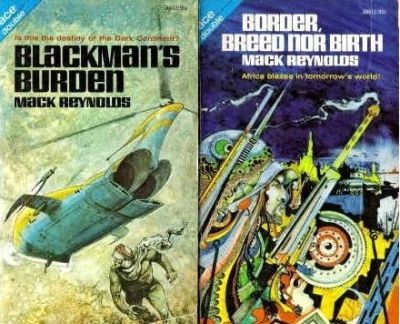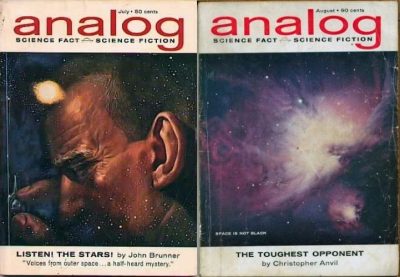Ancient Melodies
Black Man’s Burden & Border, Breed Nor Birth
By Mack Reynolds

15 Dec, 2019
Mack Reynolds’ Black Man’s Burden & Border, Breed Nor Birth, published together in a 1972 Ace Double, are the first two installments in Reynolds’ Homer Crawford series. Black Man’s Burden was first serialized in the December 1961, January 1962 issues of Analog Science Fiction Science Fact. Border, Breed Nor Birth was first serialized in the July 1962, August 1962 issues of Analog Science Fiction Science Fact.
The world is rapidly converging on a shared standard of living. The sole exception is backward Africa, victim of colonial exploitation and runaway population growth. The Reunited Nations has bold plans to drag the dark continent into the twentieth century, to turn it from a savage land into one equal to, if not America or Common Europe, at least Australia.
One major stumbling block: native Africans have ties to specific ethnic groups. Personal loyalties trump continental and racial loyalties. On the other hand, it’s no use sending white Americans, commie Russians, or Common Europeans to fix the place up. The one point on which all black African agree is profound distrust of white outsiders who arrive claiming to want to improve Africa.
As it happens, there are many people descended from Africans born outside Africa. American-born Homer Crawford, for example.
Black Man’s Burden

Crawford and the rest of his five-person team zig zag across Northern Africa, spreading progressive ideology to the backward peoples of the region. Aware that not every tribesman will welcome the prospect of their way of life being swept away in favour of a richer, more egalitarian one, Crawford and his crew have taken to ascribing their propaganda to respected and entirely fictional folk hero, El Hassan.
Local resistance to cultural genocide is obstacle enough … but there’s more. The former colonial powers may have given up political control of the continent, but they still covet economic control of Africa, as does China. The Arab Union sees a power vacuum into which they can move. The two superpowers, America and commie Russia, are determined to control Africa, if only to prevent the Other Side from winning out. None of the outside groups have Africa’s needs at heart.
Crawford is at best a means to an end for the various neo-colonial groups. At worst, his success undermines foreign ambitions. The RUN grudgingly tolerates Crawford’s fondness for extreme pragmatism, since his team gets results. Other powers see him as an impediment to be removed. He could be sent back to America. Simpler, however, to just shoot him.
Stalked by assassins, impeded by do-gooders who lack Crawford’s vision for African prosperity, Crawford can see only one path to success. He must become El Hassan!
Border, Breed Nor Birth

Reborn as El Hassan, Crawford has half-a-dozen supporters and a price on his head; he also has heavily-armed pursuers and the enmity of every major power on the planet. It’s not a great hand but it’s the only hand Crawford and his team have.
Despite years of RUN effort, North Africa is still a chaotic place. The Arab Union believes that the crisis Crawford set off in the previous book is the opportunity they’ve been waiting for to recapitulate the successes of the Umayyad Caliphate and bring all North Africa under Arab rule. Arab armies begin to march west.
This in turn provides Crawford with his own opportunity. North Africa’s patchwork of cultures includes many who do not want to be conquered by the Arab Union. If El Hassan can lead them to victory over the invaders, then El Hassan has their loyalty. It’s a baby step but one that could in time lead to Crawford’s dream of a unified, wealthy Africa.
At least one superpower is willing to go to great extremes to strangle Crawford’s Africa in its crib.
~oOo~
“Wait,” you say, “these ran in John W. Campbell, Jr.’s Analog in 1961 and 1962? Didn’t he famously reject Samuel R. Delany’s Nova in 1967 (to quote Delany)
“with a note and phone call to my agent explaining that he didn’t feel his readership would be able to relate to a black main character.”
It may seem contradictory to reject a story with a black lead from one author while having published not one but two stories about a team of black people (Well, it being 1961, Negro) from a different author half a decade earlier. It may seem odd that Campbell feared reader reaction given the Hugo voters had given Black Man’s Burden an Honorable Mention for Best Novel. One answer may be that Campbell’s explanation was what publishing professionals call “a bare-faced lie,” and that the actual reason was that notoriously racist Campbell was unwilling to buy a story with a black lead from an actual black writer.
Mack Reynolds was comfortably white. A better fit for Analog than Delany, but still a curious one. Reynolds, you see, was an actual honest to Marxist and socialist, a member of the Socialist Labor Party, a person who as a child referred to Comrade Jesus Christ since he’d never encountered someone who was not a comrade. Consequently, while Reynolds was no fan of commie Russia, he also wasn’t a fan of capitalism, seeing it as neither utopian nor likely to last any longer than any previous social-economic system.
You see, Ostrander, you make the mistake of thinking the Soviet socio-economic system is a permanent thing. It isn’t. It’s changing daily, even as our own socio-economic system is. Even if the Soviet Complex were to dominate the whole world, it would be but a temporary phase in man’s history. Their regime, in its time, right or wrong, will go under in man’s march to whatever his destiny might be. Some day it will be only a memory, and so will the socio-economic systems of the West. No institutions are less permanent than politico-economic ones.”
He had also spent a considerable time travelling the world and so was burdened with an unseemly familiarity with the world outside America. Reynold’s Africa isn’t populated by vaguely defined “Africans”. It’s populated by Tuaregs, Arabs, Berbers, Chaambra, Gabibi, and many others, speaking Arabic, Songhai, Swahili, and various colonial tongues, to mention just a few of the languages mentioned in passing. In fact, this diversity is one of the problems with which Crawford struggles, since Africa has its own well-established rivalries, exacerbated by the former colonial powers. Promoting a person of one group could be an affront to every other group. Using one language to address Africa would alienate speakers of every other language. Unifying Africa would seem as impossible as unifying Yugoslavia, Central Asia, or Scotland.
Reynolds overcame the handicap of actual knowledge of Africa with an equal knowledge of how to write to Campbell’s preferences. Not just the unchallenging prose and flat characters Campbell loved. Chunks of the novel read like they came directly from Campbell’s editorials.
A grand plan to modernize Africa could be slipped by Campbell provided it was framed in the right terms. Future Africans might be the equal of Americans, Europeans, and Chinese but in the then current day, “The average African is either a barbarian or an actual savage, one ethnic degree lower.” Such people need a singular (properly American, if not properly white) folk hero to lead them, a role a Campbellian protagonist could easily fill.
Similarly, it’s permissible to acknowledge slavery as an integral part of Revolutionary America
“(The United States) was based on chattel slavery and (the Founding Fathers) built a Utopia for themselves but certainly not for the slaves who out-numbered them. Not that they weren’t kindly and good men. A man of Jefferson’s caliber, I am sure, would have done anything in the world for those darkies of his — except get off their backs. Except to grant them the liberty and the right to pursue happiness that he demanded for himself.”
If you remember to include lines like
“Slavery isn’t necessarily an unhappy life.”
And to assure your readers that ultimately it is the slave’s own fault for being enslaved.
She said, slowly, “You know, with possibly a few exceptions, you can’t enslave a man if he doesn’t want to be a slave. For instance, the white man was never able to enslave the Amerind; he died before he would become a slave. The majority of Jefferson’s slaves wanted to be slaves.
Granted, Crawford himself admits that some issues trump personal desires:
“If it were only me, it might be different. But if it was a matter of nuclear war the whole race might well end. Given such circumstances, I’d be proud to remain on my knees the rest of my life.”
This example of a circumstance where becoming a slave is justified by the alternative being even worse is carefully placed well away from the slave-blaming bits. It’s in an entirely different novel, in fact.
The author’s attempts to pander to Campbell’s prejudices give the novels a somewhat uneven feel. Blacks (um, Negros) can be uplifted, eventually, but eugenic destiny is invoked to reassure (presumably white American) readers that their ancestors did nothing wrong in attempting Native American genocide. No, that doesn’t make sense, but it was acceptable then.
Still, it’s not the most racist series Analog ever published. It’s not even the most racist Mack Reynolds story Analog ever published1. One can say with confidence “Well, it could have been much worse and to get published in Analogin 1962, it likely could not have been any better.”
No doubt copies of the Ace Double can be found at your favourite used book seller. Black Man’s Burden is on Gutenberg, as is Border, Breed Nor Birth.
1: “Good Indian”. It was a hit with the readers (or least editors) because it has been reprinted several times. If you go looking for it, you have only yourselves to blame.
